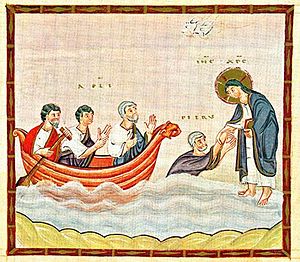
Matthew 14:22–33 narrates Jesus’ walking on water. Yet, unlike the parallel accounts in Mark 6:45–52; John 6:15–21, Matt 14:33 reports that the disciples’ conclusion, at the end of this episode, was ἀληθῶς θεοῦ υἱὸς εἶ (truly, you are the son of God). Apparently thinking along the lines similar to Heb 3:5–6, Archelaus, Disputation with Manes, 44 (ANF 6:220; affiliate disclosure), relates this text to Jesus’ superiority to Moses. Perhaps more to the point here, however, is a chaos-versus-creation motif (Boring, “Matthew,” NIB 8, 327; affiliate disclosure) in which Jesus subjects the surrounding disorder (Graves, “Followed by the Sun,” RevExp 99, no. 1 [2002]: 92; Ladd, Theology of the New Testament, rev.ed., 163 [affiliate disclosure]; Verseput, “The Faith of the Reader,” JSNT 46 [1992]: 14–16; cf. Augustine, Serm., 25.6 [NPNF1 6:338; affiliate disclosure]; Jerome, Epist., 30 [NPNF2 6:45; affiliate disclosure]). He does so, first, by walking on the sea himself and then all the more by causing Peter to do the same (Chrysostom, Hom. Matt., 50.2 [NPNF1 10:311–12; affiliate disclosure]). In this framework, then, if Israel’s God is master of the seas (e.g., Job 9:8; Ps 89:9, 19–37; Hab 3:8, 15; cf. Gen 1:2 [LXX; LSJ, s.v. ἐπιφέρω, §§2–3])—a kind of mastery not otherwise within the realm of human experience—Jesus’ walking on the sea is an eminently good reason for identifying Jesus as θεοῦ υἱός (son of God) and worshiping him as such (see Matt 14:33; Hilary of Poitiers, On the Trinity, 6.51 [NPNF2 9:117; affiliate disclosure]; cf. Mark 6:51–52; John 6:21; Aristotle, Poetics, 5.6, 6.2 [affiliate disclosure]).
Leave a Reply